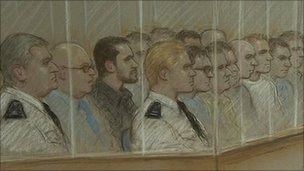Il secondo super pentito continua la sua testimnianza contro 14 imputati, accusati di crimini legati alla UVF

Tuttavia Stewart non ha potuto spiegare veramente al giudice Gillen le ragioni per quelle che definisce “discrepanze” tra quanto ha affermato in precedenza e la sua testimonianza in aula.
Il giudice Gillen ha chiesto a Stewart come sia possibile fare il nome di qualcuno durante l’interrogatorio di polizia e poi scartarlo dalla sua dichiarazione e testimonianza.
Inizialmente David Stewart ha parlato “solo di un onesto errore”, prima di ammettere: “Onestamente non posso dire il motivo”.
Però Stewart ha detto al giudice: “Come continuo a dire, le mie testimonianze attuali sono la completa verità”.
O’Donoghue, l’avvocato difensore del presunto comandante della UVF di North Belfast, Mark Haddock, nega il coinvolgimento del suo assistito nell’omidicio del rivale UDA Tommy English, freddato nell’ottobre del 2000.
Il legale ha iniziato il controinterrogatorio affermando che Haddock ha negato qualsiasi accusa portata contro di lui e in particolare ha respinto di aver pianificato o aver ricoperto qualsiasi ruolo nell’omicidio English, o in altri attacchi, o di essere presente quando David Stewart ha giurato fedeltà alla UVF.
Chiedendo scusa per la “vastità” degli argomenti toccati dal controinterrogatorio, O’Donoghue inizialmente ha portato Stewart attraverso la sua testimonianza, interrompendosi solo per chiedere al testimone se era sicuro, o se era vero al “100%” quanto veniva riportato.
Stewart ha detto all’avvocato difensore che la sua testimonianza “non era basata su congetture o eventi immaginati”.
Una volta, mentre O’Donoghue ha chiesto a Stewart: “State modellando (la testimonianza) mentre stiamo parlando?”, il pentito ha risposto: “Non lo sto facendo, ve l’ho già detto in precedenza”.
Comunque ha rifiutato di parlare delle prove fornite da chiunque altro, compreso suo fratello, per verificare gli aspetti e le differenze tra le testimonianze.
“Non posso rispondere per qualcun altro”; ha affermato David Stewart. Prima di aggiungere: “Non sto rispondendo per nessun altro”.
Dopo la pausa pranzo O’Donoghue ha iniziato a pressare Stewart su specifiche differenze nella sua testimonianza, definite menzogne dall’avvocato.
Stewart ha respinto le illazioni, parlando di piccole “discrepanze” e non di menzogne. Di errori in buona fede, di poco lontani dall’obiettivo, mere discrepanze, “ma non gigantesche”.
In ogni modo O’Donoghue ha ribattuto a Stewart: “Voi le state chiamando discrepanze, e io le chiamo menzogne”.
Stewart ha di nuovo ribadito di star dicendo la verità, mentre all’epoca dei primi interrogatori era sotto pressione, trovando difficile l’adattamento alla prigione.
Tratto da Utv
Supergrass trial witness ‘not lying’
The UVF supergrass trial has heard evidence from a second man who has implicated 14 others in some of the loyalist terrorist group’s crimes.
However, Stewart could not really explain to Belfast Crown Court judge Mr Justice Gillen the reason behind what he termed as “discrepancies” in what he had said before giving evidence in court.
Mr Justice Gillen had asked the informer how he could name someone during police interviews, whom he later discarded from his statements and evidence.
Stewart initially claimed that it was “just an honest mistake”, before later admitting: “I couldn’t honestly tell you”.
However, Stewart then told Mr Justice Gillen: “As I keep saying my statements now are the complete truth.”
Mr O’Donoghue, who is representing the alleged Mount Vernon commander of the UVF in north Belfast, Mark Haddock – who along with eight of the accused – denies involvement in the murder of loyalist UDA rival Tommy English in October 2000.
He began Stewart’s cross-examination by saying that Haddock denied every allegation made against him and particularly denied planning or having any role in the English murder, or any other attacks, or being present when he, Stewart, was sworn into the UVF.
Apologising for the fact that the cross-examination was to be “wide-ranging,” Mr O’Donoghue initially began taking Stewart through his evidence, only pausing at times to ask the witness if he was sure, or “100%” right in what he had said.
Stewart also agreed with the lawyer that his evidence was “not based on any assumption or imagined event”, and that he was “not making this up”.
At one stage when Mr O’Donoghue asked Stewart: “Are you making this up as you go along?”
The informer replied: “No I am not making this up as I go along, I have told you that before”.
However, he refused to be drawn on the evidence of anyone else, including his own brother about aspects of his evidence and how it might differ from others.
“I can’t answer for anybody else,” said Stewart, before adding: “I am not going to answer for anybody.”
It was after the lunch break that Mr O’Donoghue began to press Stewart about specific differences in his evidence, which he described as lies.
Stewart rejected the suggestion, claiming that they were little more than “discrepancies”, not lies, just genuine mistakes which were a little out of focus, mere discrepancies, “but not gigantic ones”.
However, at one stage Mr O’Donoghue told Stewart: “You are calling them discrepancies and I am calling them lies”.
Stewart maintained he was now telling the truth and claimed that at the time he was under pressure, finding it hard to settle into prison, and was being weaned off drugs.
The trial continues.